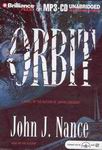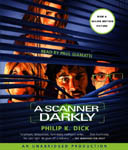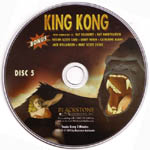
 We first told you about LibriVox and its many ongoing FREE audiobook projects last year. Since then many of their titles have been completed. The LibriVox volunteers have read and recorded chapters of books, entire novels and short stories from the public domain using their home equipment. Their lofty objective? To eventually make every book in the public domain available in the audio format! That goal is well on its way to success. LibriVox now has more than three dozen Science Fiction, Fantasy and Horror titles completed. There are even more “in-progress.” So with that wonderous news in mind here is the complete* list of all the SF Fantasy and Horror with links to the files :
We first told you about LibriVox and its many ongoing FREE audiobook projects last year. Since then many of their titles have been completed. The LibriVox volunteers have read and recorded chapters of books, entire novels and short stories from the public domain using their home equipment. Their lofty objective? To eventually make every book in the public domain available in the audio format! That goal is well on its way to success. LibriVox now has more than three dozen Science Fiction, Fantasy and Horror titles completed. There are even more “in-progress.” So with that wonderous news in mind here is the complete* list of all the SF Fantasy and Horror with links to the files :
UNABRIDGED BOOKS:
Andersen’s Fairy Tales (Short Stories)
By Hans Christian Andersen; Read by Various Readers
1 Zipped File full of MP3s – 5 Hours 51 Minutes [UNABRIDGED]
The Marvelous Land of Oz (Book 2 In The Oz Series)
By L. Frank Baum; Read by Paul Harvey
1 Zipped File full of MP3s – 4 Hours 32 Minutes [UNABRIDGED]
Dorothy And The Wizard in Oz (Book 4 In The Oz Series)
By L. Frank Baum; Read by Judy Bieber
1 Zipped File full of MP3s – ? Hours [UNABRIDGED]
The Road To Oz (Book 5 In The Oz Series)
By L. Frank Baum; Read by Kara Shallenberg
1 Zipped File full of MP3s – 4.7 Hours [UNABRIDGED]
Sky Island
By L. Frank Baum; Read by Judy Bieber
1 Zipped File full of MP3s – 5 Hours 41 Minutes [UNABRIDGED]
Present At A Hanging and Other Ghost Stories (Short Stories)
By Ambrose Beirce; Read by Peter Yearsley
1 Zipped File full of MP3s – ? Hours [UNABRIDGED]
A Princess Of Mars (First In The John Carter Series)
By Edgar Rice Burroughs; Read by Various Readers
1 Zipped File full of MP3s – ? Hours [UNABRIDGED]
Alice’s Adventures In Wonderland (First In The Alice Series)
By Lewis Carroll; Read by Various Readers
1 Zipped File full of MP3s – 2 Hours 58 Minutes [UNABRIDGED]
Through The Looking-Glass (Second In The Alice Series)
By Lewis Carroll; Read by
1 Zipped File full of MP3s – 3 Hours 19 Minutes [UNABRIDGED]
The Wind In The Willows
By Kenneth Grahame; Read by Mark F. Smith
1 Zipped File full of MP3s – 6 Hours 47 Minutes [UNABRIDGED]
Fairy Tales (Short Stories)
By Jacob and Wilhelm Grimm (Brothers Grimm); Read by Various Readers
1 Zipped File full of MP3s – 10 Hours 32 Minutes [UNABRIDGED]
The Story Of Doctor Dolittle
By Hugh Lofting; Read by Various Readers
1 Zipped File full of MP3s – 3 Hours 8 Minutes [UNABRIDGED]
Call Of The Wild
By Jack London; Read by Various Readers
1 Zipped File full of MP3s – ? Hours [UNABRIDGED]
White Fang
By Jack London; Read by Various Readers
1 Zipped File full of MP3s – 8 Hours 28 Minutes [UNABRIDGED]
Great Big Treasury Of Beatrix Potter (Short Stories)
By Beatrix Potter; Read by Various Readers
1 Zipped File full of MP3s – 3 Hours 31 Minutes [UNABRIDGED]
Frankenstein, Or The Modern Prometheus
By Mary Shelley; Read by Various Readers
1 Zipped File full of MP3s – ? Hours [UNABRIDGED]
Dracula
By Bram Stoker; Read by Various Readers
1 Zipped File full of MP3s – 16 Hours 31 Minutes [UNABRIDGED]
A Connecticut Yankee In King Arthur’s Court
By Mark Twain; Read by Steve Anderson
1 Zipped File full of MP3s – 13 Hours 42 Minutes [UNABRIDGED]
A Journey To The Interior Of The Earth
By Jules Verne; Read by Various Readers
1 Zipped File full of MP3s – 8 Hours 10 Minutes [UNABRIDGED]
The Invisible Man
By H.G. Wells; Read by Alex Foster
1 Zipped File full of MP3s – 4 Hours 54 Minutes [UNABRIDGED]
The War Of The Worlds
By H.G. Wells; Read by Rebecca
1 Zipped File full of MP3s – 6 Hours 35 Minutes [UNABRIDGED]
The War Of The Worlds
By H.G. Wells; Read by Various Readers
1 Zipped File full of MP3s – Approx 7 Hours [UNABRIDGED]
The Velveteen Rabbit
By Margery Williams; Read by Marlo Dianne
1 MP3 – 28 Minutes 50 Seconds [UNABRIDGED]
UNABRIDGED SHORT STORIES:
The Black Cat
By Edgar Allan Poe; Read by Tom Yates
1 MP3 File – 26 Minutes 58 Seconds [UNABRIDGED]
The Black Cat
By Edgar Allan Poe; Read by Don Morgan
1 MP3 File – 32 Minutes 43 Seconds [UNABRIDGED]
The Pit and the Pendulum
By Edgar Allan Poe; Read by Eric S. Piotrowski
1 MP3 File – 39 Minutes 8 Seconds [UNABRIDGED]
The Telltale Heart
By Edgar Allan Poe; Read by Don Morgan
1 MP3 File – 18 Minutes 8 Seconds [UNABRIDGED]
The Cask of Amontillado
By Edgar Allan Poe; Read by Zach Weissmueller and Ryan Heuser
1 MP3 File – 15 Minutes 45 Seconds [UNABRIDGED]
The Masque of the Red Death
By Edgar Allan Poe; Read by Juan Carlos Bagnell
1 MP3 File – 16 Minutes [UNABRIDGED]
The Monkey’s Paw
By W.W. Jacobs; Read by annegram
1 MP3 File – 25 Minutes 52 Seconds [UNABRIDGED]
The Signal-Man
By Charles Dickens; Read by: Andrew Miller
1 MP3 File – 36 Minutes 58 Seconds [UNABRIDGED]
Tale Of Peter Rabbit
By Beatrix Potter; Read by: Kevin Devine
1 MP3 File – 6 Minutes 26 Seconds [UNABRIDGED]
To Build A Fire
By Jack London; Read by Betsie Bush
1 MP3 File – 40 Minutes 03 Seconds [UNABRIDGED]
The Birth Mark
By Nathaniel Hawthorne; Read by Katy Preston
1 MP3 File – 38 Minutes 8 Seconds [UNABRIDGED]
An Occurence at Owl Creek Bridge
By Ambrose Bierce; Read by Matthew Stewart-Fulton
1 MP3 File – 22 Minutes 1 Second [UNABRIDGED]
The Yellow Wallpaper
By Charlotte Perkins Gilman; Read by Justine Young
1 MP3 File – 28 Minutes 18 Seconds [UNABRIDGED]
*Any keeners out there are invited to let me know if I missed any SF Fantasy or Horror audiobooks completed by LibriVox that I didn’t recognize as such. Check out the actual list of all of their completed audiobooks on the LibriVox site HERE.
posted by Jesse Willis

 Orbit
Orbit
 A Scanner Darkly
A Scanner Darkly





